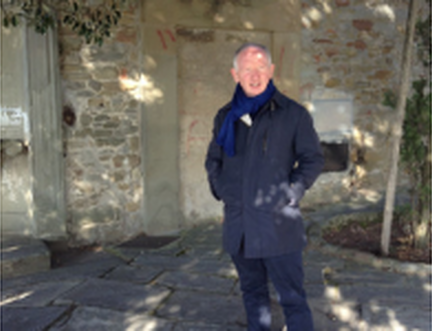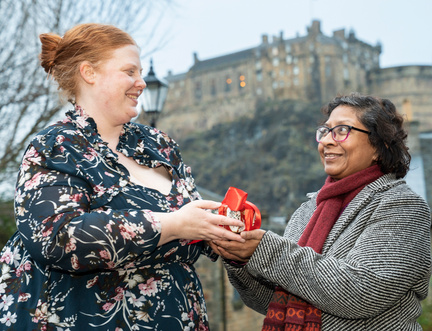More articles Friday 26 August 2016 2:20pm
Glasgow, Reimagined

As a young boy growing up in Musselburgh, “the idea that I would work in, live in or produce a book on Glasgow would have been astonishing,” journalist Alan Taylor told the Book Festival. “Glasgow was as alien to us as Moldovia. Assuming they had hacksaws in Moldovia.” And yet this “anthologist of genius”, as chair Richard Holloway called him, has indeed produced a book: a panoramic collection of takes on the city and its culture entitled Glasgow: The Autobiography.
The mutual suspicion between Glaswegians and those dwelling further East of course endures, and Taylor made some effort to define the differences. Glasgow’s historic poverty, he said, birthed not only the storied overcrowding, violence and poor health but also “a perverse optimism. Glaswegians tend to be very upbeat despite the worst circumstances.” And the city retains a disarming penchant for self-mockery. “There’s an upfrontness about Glasgow. It’s happy to undermine its own cultural credentials and be self-deprecating. Edinburgh isn’t self-deprecating.” If Glasgow’s famous slogan was ‘Glasgow’s Miles Better’, Taylor proposed that Edinburgh might adopt, ‘Edinburgh’s Slightly Superior’.
Yet this most punchy and characterful of cities has, said Taylor, only lately affirmed a strong literary presence. As famously defined by Alasdair Gray in his classic 1981 novel Lanark, it was for centuries an ”unimagined” place. “Until Alan Spence, William McIlvanney, Alasdair Gray, Liz Lochhead, Glasgow hadn’t the writers it deserved. Where was its Zola, its Mark Twain, its James Joyce? Glasgow wasn’t recreated in fiction in such a way that people on the outside could imagine it.”
What was famously vibrant and self-assured was its journalistic culture, the glory days of which Taylor recalls from his own early work in newspapers. “I love journalists and newspaper people and Glasgow had great newspaper people. Witty, hard-working, hard-drinking… they’d given their livers to their work.” The past tense is noticeable. Taylor was unsparing about the problems currently facing Scotland’s newspapers, citing “foreign ownership; uninspired editors; no promotion of the papers; a lack of ideas, a lack of wit” as reasons for their relative decline. “You can be positive about it and say that journalism exists in another form – but it doesn’t exist in the way people remember it, when everyone read the same things and talked about them.”
Other less proud aspects of Glasgow’s culture came up for discussion. Taylor mentioned Alan Spence’s collection Its Colours They Are Fine as his own introduction to the context and impact of sectarianism. “It was when I read that book that I first understood it. It’s sickness – you don’t need it to define you, but it’s very hard to eradicate.” Another controversial aspect of the city’s history – its connections with the slave trade – remains, he said, to be fully explored. “There needs to be a lot more work done on it. Clearly much of the Merchant City is built on the tobacco trade. It’s there in the street names - but we’ve been pretty good at sweeping it under the carpet. What we’ve got there are great buildings, and a stained past.” One that provides a rich source, however, for historians, authors and anthologists of genius alike.
- 2025 Festival:
- 9-24 August
Latest News
 Communities Programme participants celebrate success of 2024
Communities Programme participants celebrate success of 2024



